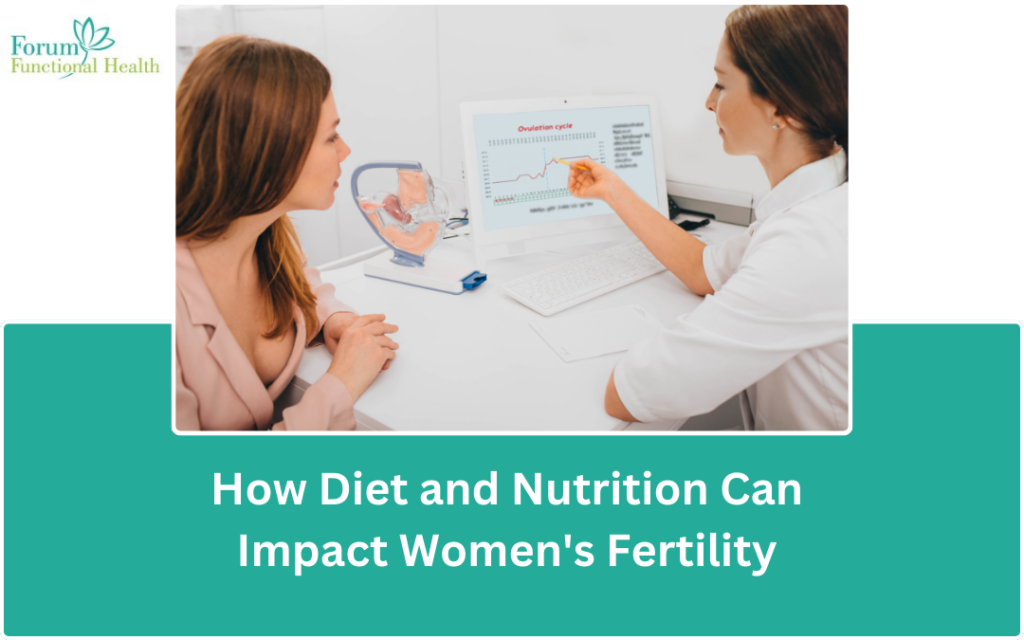How Diet and Nutrition Can Impact Women’s Fertility

In the journey toward parenthood, understanding the intricate relationship between diet, nutrition, and fertility is paramount. The choices we make in our daily dietary habits can significantly influence women’s fertility. By delving into how diet and nutrition intersect with fertility, we unveil a pathway toward optimizing reproductive health and increasing the likelihood of conception.
Nourishing the Body for Fertility
Ensuring proper nourishment lays the foundation for optimal fertility. A diet rich in essential nutrients provides the body with the building blocks necessary for reproductive health. Nutrient-dense foods such as fruits, vegetables, whole grains, and lean proteins support hormonal balance and promote reproductive function.
Adequate intake of vitamins and minerals, including folate, iron, and zinc, is particularly crucial for women’s fertility. These nutrients contribute to egg health, hormone regulation, and overall reproductive well-being.
Balancing Hormones through Diet
Hormonal balance is key to fertility, and diet plays a pivotal role in regulating hormonal levels. Certain foods can impact hormone production and metabolism, influencing fertility outcomes. For instance, consuming omega-3 fatty acids found in fatty fish can help regulate menstrual cycles and improve ovulation.
On the other hand, excessive consumption of processed foods high in refined sugars and unhealthy fats can disrupt hormonal balance, potentially impairing fertility. Striving for a balanced diet rich in whole foods can help maintain optimal hormone levels and support reproductive health.
Managing Weight for Fertility Optimization
Weight management is intricately linked to fertility, with both underweight and overweight conditions posing challenges to conception. Achieving and maintaining a healthy weight through balanced nutrition and regular physical activity is crucial for optimizing fertility.
Excess body fat can disrupt hormone production and ovulation, leading to irregular menstrual cycles and decreased fertility. Conversely, being underweight can also impact hormonal balance, potentially hindering ovulation and conception. By adopting a balanced diet and lifestyle, women can support their fertility journey by maintaining a healthy weight.
Enhancing Egg Quality and Ovulation
The quality of eggs released during ovulation is a critical factor in fertility outcomes. Diet and nutrition can significantly influence egg quality, thereby impacting the chances of successful conception.
Antioxidant-rich foods such as berries, leafy greens, and nuts can help protect eggs from oxidative stress and improve overall egg quality. Additionally, incorporating fertility-boosting nutrients like coenzyme Q10 and L-arginine into the diet can support ovarian function and enhance ovulation.
Addressing Nutritional Deficiencies
Nutritional deficiencies can undermine fertility health, highlighting the importance of addressing any gaps in dietary intake. Consulting with a healthcare provider or fertility specialist can help identify potential deficiencies and develop personalized dietary strategies to address them.
Common nutrient deficiencies that may impact fertility include iron, vitamin D, and folate. By optimizing nutrient intake through dietary modifications or supplementation, women can address underlying nutritional imbalances and support their fertility journey.
Fueling Fertility with Super foods
Certain foods are renowned for their fertility-boosting properties, earning them the title of “superfoods” in the realm of reproductive health. These nutrient-packed foods offer a concentrated source of essential vitamins, minerals, and antioxidants, promoting fertility and supporting reproductive function.
Examples of fertility superfoods include
Wild-caught Salmon: Rich in omega-3 fatty acids and protein, salmon supports hormone production and enhances fertility.
Avocado: Loaded with healthy fats and potassium, avocado promotes hormonal balance and reproductive health.
Spinach: Packed with iron, folate, and antioxidants, spinach supports ovulation and improves egg quality.
Incorporating these superfoods into a balanced diet can amplify fertility potential and optimize reproductive outcomes.
Seeking Professional Guidance
Forum Functional Health Care emphasizes the crucial role of dietary modifications in positively impacting fertility. While acknowledging the significance of this aspect, it underscores the necessity of seeking professional guidance from healthcare providers or registered dieticians. These experts are equipped to offer personalized recommendations tailored to individual needs and can address any underlying health concerns that may affect fertility.
By collaborating with a healthcare team, women can navigate their fertility journey with confidence, knowing they are receiving expert guidance. This approach allows for the optimization of chances of conceiving successfully.
Understanding the profound impact of diet and nutrition on women’s fertility empowers individuals to make informed choices that support reproductive health. By prioritizing nutrient-dense foods, balancing hormones, managing weight, and addressing nutritional deficiencies, women can optimize their fertility potential and embark on their journey toward parenthood with confidence.
It’s important to remember that each woman’s fertility journey is unique, and seeking professional guidance can provide personalized support tailored to individual needs. With the right approach to diet and nutrition, women can boost their chances of conception and embark on the rewarding path to parenthood.
